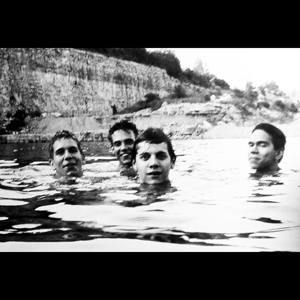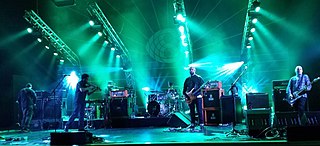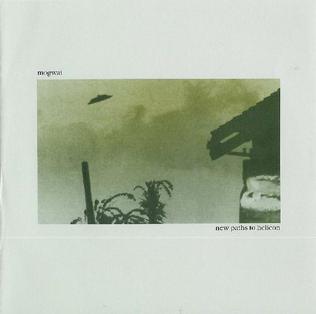
Shellac is an American noise rock band from Chicago, Illinois, composed of Steve Albini, Bob Weston and Todd Trainer and formed in 1992.

Surfer Rosa is the debut studio album by the American alternative rock band Pixies, released in March 1988 on the British label 4AD. It was produced by Steve Albini. Surfer Rosa contains many of the elements of Pixies' earlier output, including Spanish lyrics and references to Puerto Rico. It includes references to mutilation and voyeurism alongside experimental recording techniques and a distinctive drum sound.
Noise rock is a noise-oriented style of experimental rock that spun off from punk rock in the 1980s. Drawing on movements such as minimalism, industrial music, and New York hardcore, artists indulge in extreme levels of distortion through the use of electric guitars and, less frequently, electronic instrumentation, either to provide percussive sounds or to contribute to the overall arrangement.

Spiderland is the second and final studio album by the American rock band Slint. It contains six songs played over 40 minutes, and was released by Touch and Go Records on March 27, 1991. Slint's lineup at the time of recording comprised Brian McMahan on vocals and guitar, David Pajo on guitar, Todd Brashear on bass guitar and Britt Walford on drums. Spiderland was engineered by Brian Paulson and recorded over four days in August 1990. The music and vocal melodies were composed throughout the summer of 1990, while lyrics were written in-studio.

Mogwai are a Scottish post-rock band, formed in 1995 in Glasgow. The band consists of Stuart Braithwaite, Barry Burns, Dominic Aitchison, and Martin Bulloch (drums). Mogwai typically composes lengthy guitar-based instrumental pieces that feature dynamic contrast, melodic bass guitar lines, and heavy use of distortion and effects.

Steve Albini is an American musician, record producer, audio engineer and music journalist. He was a member of Big Black, Rapeman and Flour, and is a member of Shellac. He is the founder, owner and principal engineer of Electrical Audio, a recording studio complex in Chicago. In 2018, Albini estimated that he had worked on several thousand albums over his career. He has worked with acts such as Nirvana, Pixies, the Breeders, PJ Harvey, and former Led Zeppelin members Jimmy Page and Robert Plant.
"Tracy" is a song on the Scottish post-rock band Mogwai's 1997 debut album, Mogwai Young Team. The song was written by the band's guitarists Stuart Braithwaite and John Cummings and bassist Dominic Aitchison prior to the 1997 Mogwai Young Team recording sessions.
"Mogwai Fear Satan" is an instrumental by Scottish post-rock group Mogwai. It appears as the closing track for their 1997 debut studio album, Mogwai Young Team.
"Like Herod" is a song by Scottish post-rock band Mogwai from their 1997 debut studio album, Mogwai Young Team, written by Stuart Braithwaite, Dominic Aitchison, John Cummings and Martin Bulloch. As well as being a fan-favourite, the song is a live staple, and an extreme display of Mogwai's quiet/loud dynamic contrast method. An 18-minute-long version of "Like Herod" appears on Mogwai's live compilation album, Government Commissions: BBC Sessions 1996-2003. The song was originally titled "Slint", referring to the influential American post-rock band Slint. Stuart Braithwaite has said that "Like Herod" is his favourite song from Mogwai Young Team.
"Starless" is a composition by English progressive rock band King Crimson. It is the final track on their seventh studio album, Red, released on 6 October 1974.
"Yes! I Am a Long Way from Home" is the opening track on the Scottish post-rock band Mogwai's 1997 debut album, Mogwai Young Team. It was primarily composed by the band's bassist, Dominic Aitchison, prior to the 1997 Mogwai Young Team recording sessions.
"Summer" is a piece of music by Mogwai released as a double A-side with "Ithica 27ø9" on 4 November 1996 and eventually included on Ten Rapid . A version of "Summer" called "Summer " is included on Mogwai's debut album, Young Team.

"New Paths to Helicon, Pt. 1" is a song by Scottish band Mogwai. It was first released as a double A-side with "New Paths to Helicon, Pt. 2" on 7" limited to 3,000 copies. It was later included on the 1997 compilation album, Ten Rapid . The single reached #2 in English radio presenter John Peel's Festive Fifty Chart in 1997. The single's cover art shows details from the McMinnville UFO photographs.

"New Paths to Helicon, Pt. 2" is a song by Scottish band Mogwai. It was first released as a double A-side with "New Paths to Helicon, Pt. 1", on 7" limited to 3000 copies. It was later included on the 1997 compilation album, Ten Rapid . The single reached #2 in English radio presenter John Peel's 1997 Festive Fifty Chart.
Avinu Malkeinu is a Jewish prayer recited during Jewish services during the Ten Days of Repentance, from Rosh Hashanah through Yom Kippur inclusive. Since the 17th century, most Eastern Ashkenazic communities recite it also on all fast days; in the Sephardic and Western Ashkenazic tradition it is recited only during the Ten Days of Repentance.
"Ithica 27 ϕ 9" is a song by Scottish post-rock band Mogwai.
Avinu means "Our Father" in Hebrew. The term may also refer to:

A Wrenched Virile Lore is a remix album by Scottish post-rock band Mogwai consisting of tracks from their 2011 album Hardcore Will Never Die, But You Will remixed by various artists. It was released on 19 November 2012 by Rock Action Records, apart from the US where it was released on 4 December by Sub Pop. The album was offered in a limited edition of 2500 vinyl albums, and on CD and digital download.

Come On Die Young is the second studio album by Scottish post-rock band Mogwai. The album was released on 29 March 1999 by Chemikal Underground.

Compassion is a live album recorded at the Sydney Opera House in September 2013 by Nigel Westlake, Lior and Sydney Symphony Orchestra. Compassion is an orchestral song cycle for voice and orchestra consisting of original melodies and orchestration set to ancient texts in Hebrew and Arabic, all centred around the wisdom of compassion. The album was released in November 2013.









